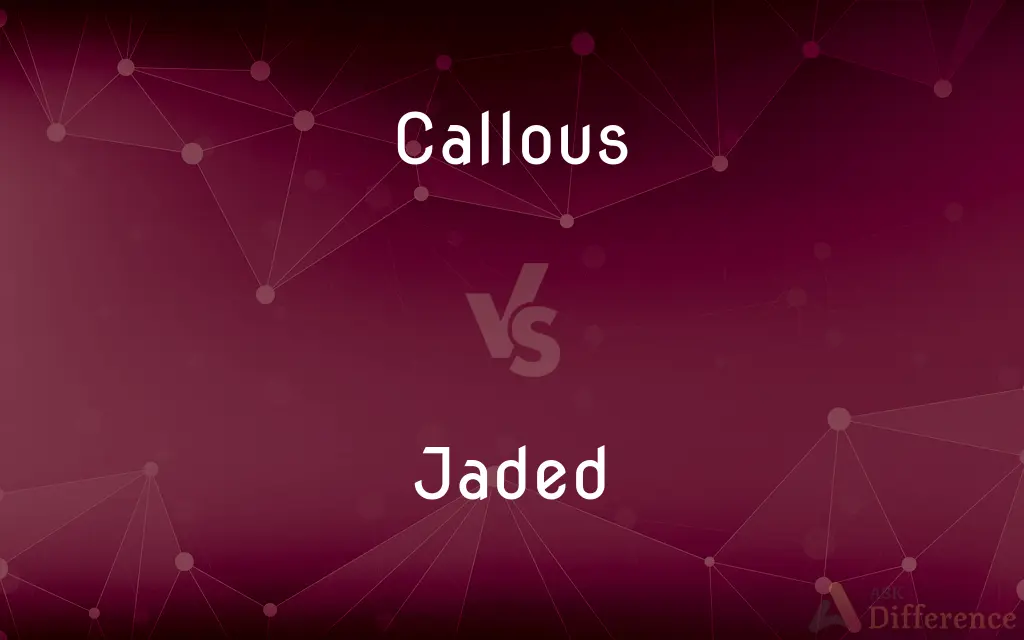Callous vs. Jaded — What's the Difference?
Edited by Tayyaba Rehman — By Urooj Arif — Updated on April 17, 2024
Callous implies a hardened emotional disposition often due to a lack of sympathy or regard for others, whereas jaded suggests weariness or disillusionment typically resulting from overexposure or repeated disappointments.

Difference Between Callous and Jaded
Table of Contents
ADVERTISEMENT
Key Differences
Callousness is characterized by emotional insensitivity or indifference, reflecting a hardened attitude toward others or suffering. On the other hand, jadedness arises from continuous exposure to certain experiences, leading to a sense of boredom or loss of enthusiasm.
A callous individual may show a lack of empathy and reluctance to acknowledge the emotional needs of others, which is a result of desensitization to feelings. Whereas, a jaded person might still retain empathy but feels a lack of excitement or interest due to past overstimulation or disappointments.
In many contexts, being callous is viewed negatively as it relates to a deliberate disregard for others' feelings. On the other hand, being jaded is often seen more as a self-protective mechanism and less morally loaded, stemming from a need to guard oneself against further emotional drain.
The origins of callousness can often be traced to an individual’s choice or natural disposition, which cultivates a tough, insensitive personality. In contrast, jadedness is usually acquired after prolonged exposure to monotonous or disheartening scenarios.
Workplace environments can reveal these traits distinctly; a callous boss might ignore the hardships of employees, showing no concern. Whereas, a jaded employee might perform duties lacklusterly, feeling no joy or satisfaction from achievements once valued.
ADVERTISEMENT
Comparison Chart
Definition
Showing or having an insensitive and cruel disregard for others.
Tired, bored, or lacking enthusiasm, typically after having had too much of something.
Cause
Often a natural disposition or a conscious choice to disregard others' feelings.
Result of overexposure to certain experiences leading to disenchantment.
Emotional Response
Lack of empathy, indifference to others’ distress.
Diminished excitement or interest, weariness towards situations.
Perception
Generally viewed negatively, associated with moral insensitivity.
Often seen as a self-protective response, less morally judged.
Common Contexts
Can be evident in personal relationships, leadership roles.
Frequently observed in professions with high burnout rates, repetitive tasks.
Compare with Definitions
Callous
Unsympathetic.
The supervisor was callous about her staff's complaints.
Jaded
Disillusioned.
After numerous failed attempts, his jaded perspective was understandable.
Callous
Unfeeling.
Her callous remarks about the homeless were shocking.
Jaded
Overexposed.
Watching too many thrillers had left her jaded.
Callous
Hardened.
Years of being a judge had made him callous to criminals’ pleas.
Jaded
Wearied.
He felt jaded after twenty years in the same job.
Callous
Insensitive.
His callous disregard for the environment was evident in his policies.
Jaded
Unenthusiastic.
Her jaded response to the proposal was due to past disappointments.
Callous
Indifferent.
He gave a callous laugh at the sad story.
Jaded
Bored.
Their jaded attitudes made the new project seem unexciting.
Callous
Showing or having an insensitive and cruel disregard for others
His callous comments about the murder made me shiver
Jaded
Worn out; wearied
"My father's words had left me jaded and depressed" (William Styron).
Callous
Variant spelling of callus
Jaded
Dulled by surfeit; sated
"the sickeningly sweet life of the amoral, jaded, bored upper classes" (John Simon).
Callous
Having calluses; toughened
Callous skin on the elbow.
Jaded
Cynically or pretentiously callous.
Callous
Emotionally hardened; unfeeling
A callous indifference to the suffering of others.
Jaded
Bored or lacking enthusiasm, typically after having been over exposed to, or having consumed too much of something.
Callous
To make or become callous.
Jaded
Worn out, wearied, exhausted or lacking enthusiasm, due to age or experience.
Callous
(figurative) Emotionally hardened; unfeeling and indifferent to the suffering/feelings of others.
She was so callous that she could criticise a cancer patient for wearing a wig.
Jaded
Made callous or cynically insensitive, by experience.
Callous
(literal) Having calluses, or relating to calluses.
Jaded
Simple past tense and past participle of jade
Callous
Alternative form of callus
Jaded
Dulled by surfeit; as, the amoral, jaded, bored upper classes.
Callous
Alternative form of callus
Jaded
Fatigued due to excess effort.
My father's words had left me jaded and depressed
Callous
Hardened; indurated.
Jaded
Exhausted;
My father's words had left me jaded and depressed
Callous
Hardened in mind; insensible; unfeeling; unsusceptible.
It is an immense blessing to be perfectly callous to ridicule.
A callousness and numbness of soul.
Jaded
Dulled by surfeit;
The amoral, jaded, bored upper classes
Callous
Make insensitive or callous; deaden feelings or morals
Callous
Emotionally hardened;
A callous indifference to suffering
Cold-blooded and indurate to public opinion
Common Curiosities
How does being jaded differ from being bored?
Jaded implies a deep-seated weariness from repeated exposure, whereas boredom is a more transient feeling of disinterest.
What causes someone to become callous?
It often develops from a lack of empathy, possibly influenced by personal experiences or inherent personality traits.
Is being callous always intentional?
Not necessarily; it can be an unconscious defense mechanism, although it often involves some level of conscious disregard for others.
Does jadedness affect job performance?
It can, as it often leads to a lack of enthusiasm and motivation, which are crucial for productive work.
What are typical signs of a callous individual?
Indifference to suffering, lack of empathy, and disregard for others' feelings are common signs.
How can one manage feelings of being jaded?
Seeking new challenges, engaging in different activities, or taking breaks can help rejuvenate one's interest and enthusiasm.
What can lead to a person becoming callous?
Prolonged exposure to situations where empathy is seen as a liability, such as in certain professional or survival scenarios, can lead to callousness.
Do jaded people still experience joy?
They can, but their threshold for what brings joy might be higher due to their general weariness.
Can a person be both callous and jaded?
Yes, someone can exhibit both traits, particularly in emotionally draining or highly demanding environments.
Is jadedness reversible?
Yes, changing circumstances or new, stimulating experiences can alleviate feelings of jadedness.
Can jadedness be a temporary state?
Yes, it is usually related to specific circumstances and can change with new experiences.
Is there a way to overcome callousness?
Increasing emotional awareness and fostering empathy through reflective practices and engagement with diverse social groups can help.
How does society typically view callous behavior?
It is generally viewed negatively, often seen as lacking compassion and humanity.
Can jaded feelings influence personal relationships?
Yes, they can make individuals less emotionally available and more cynical, potentially harming relationships.
What is the first step towards addressing jadedness in oneself?
Acknowledging the feeling and identifying its sources is the first step towards addressing and managing jadedness effectively.
Share Your Discovery

Previous Comparison
Overlaying vs. Overlying
Next Comparison
Effervescent vs. SmilingAuthor Spotlight
Written by
Urooj ArifUrooj is a skilled content writer at Ask Difference, known for her exceptional ability to simplify complex topics into engaging and informative content. With a passion for research and a flair for clear, concise writing, she consistently delivers articles that resonate with our diverse audience.
Edited by
Tayyaba RehmanTayyaba Rehman is a distinguished writer, currently serving as a primary contributor to askdifference.com. As a researcher in semantics and etymology, Tayyaba's passion for the complexity of languages and their distinctions has found a perfect home on the platform. Tayyaba delves into the intricacies of language, distinguishing between commonly confused words and phrases, thereby providing clarity for readers worldwide.














































